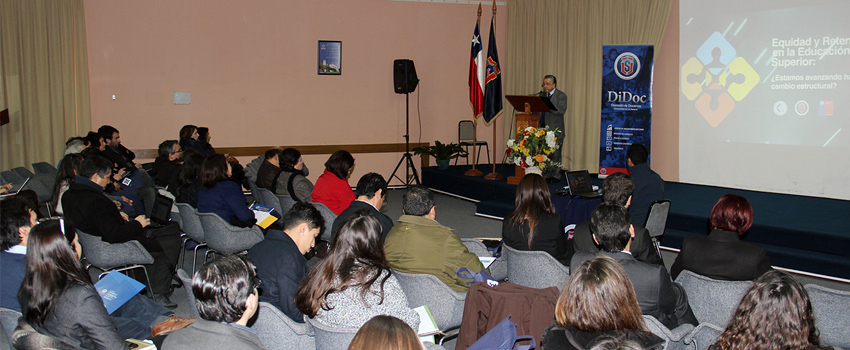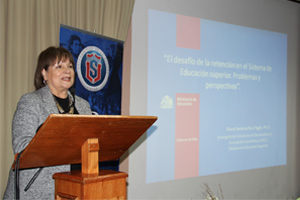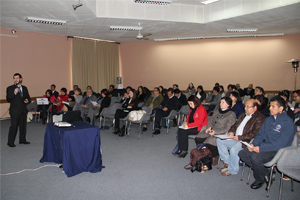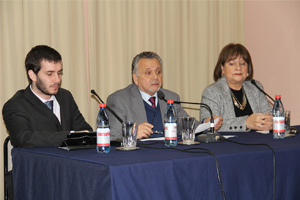- News
U. de La Serena organizes Seminar “Equity and Retention in Higher Education”

For two days, representatives of the schools that make up CRUCH share initiatives developed to improve equity and student retention.
At the University of La Serena, the Seminar “Equity and Retention in Higher Education: Are we moving towards a structural change?”, organized by this house of higher education, through the Vice-Rector's Office, will take place starting this Thursday, June 26. Academic and the Teaching Directorate, with the collaboration of the Ministry of Education and the CRUCH. The meeting, in which representatives of the institutions belonging to the Council of Rectors participate, aims to share the initiatives they have developed to improve equity and student retention, as well as analyze the impact of their own experiences and generate proposals that allow them to move towards structural change.
 At the inauguration of this Seminar, the academic vice-rector of the University of La Serena, Dr. Jorge Catalán, pointed out that the activity is framed within a set of policies and actions aimed at promoting equity in higher education and that involve aspects financial, admission and academic matters. “The task is of great magnitude, since it is part of a larger context of social inequalities that are manifested in the educational system, and consequently, in the higher education subsystem, which must not only recognize them and avoid reproducing them, but also, as an ethical imperative, to contribute to overcoming them,” he stated.
At the inauguration of this Seminar, the academic vice-rector of the University of La Serena, Dr. Jorge Catalán, pointed out that the activity is framed within a set of policies and actions aimed at promoting equity in higher education and that involve aspects financial, admission and academic matters. “The task is of great magnitude, since it is part of a larger context of social inequalities that are manifested in the educational system, and consequently, in the higher education subsystem, which must not only recognize them and avoid reproducing them, but also, as an ethical imperative, to contribute to overcoming them,” he stated.
Furthermore, Dr. Catalán stated that “it is of strong interest to promote the sharing of participating institutions, but especially to develop a proactive approach to the issue that calls us together, which can be translated into agreements and commitments to continue moving forward.” And he added that through this meeting “we not only want to be participants in the changes, but co-protagonists and, even more, occasional leaders in the exercise of rotating leadership in the national concert, in a manner consistent with the discourse about equality of opportunities, which has a special meaning for those of us who are members of state and even regional universities.”
 The opening day began with the presentation: “Ranking of grades in the 2014 Admission process”, by the researcher of the Single Admission System of the Council of Rectors of Chilean Universities, Tomás Larroucau, who referred to the changes in the weightings produced in the 2014 process and the impact that the modification had on the weightings of the Grade Ranking, pointing out that this did not produce major changes in the composition of the system as a whole (1.350 students manage to access a degree thanks to the new weightings), but we can see an important movement of students within the system (about 10% of students change in the career in which they are selected thanks to the new weightings and around 5% of the total students are selected in another university). He also highlighted that the increase in weighting manages to improve the selection preference of 5.081 students (5% of the total selected), highlighting students with good academic performance, students from municipal and subsidized private establishments, women over men, students from more vulnerable establishments and from the first income brackets, and students from technical-professional establishments.
The opening day began with the presentation: “Ranking of grades in the 2014 Admission process”, by the researcher of the Single Admission System of the Council of Rectors of Chilean Universities, Tomás Larroucau, who referred to the changes in the weightings produced in the 2014 process and the impact that the modification had on the weightings of the Grade Ranking, pointing out that this did not produce major changes in the composition of the system as a whole (1.350 students manage to access a degree thanks to the new weightings), but we can see an important movement of students within the system (about 10% of students change in the career in which they are selected thanks to the new weightings and around 5% of the total students are selected in another university). He also highlighted that the increase in weighting manages to improve the selection preference of 5.081 students (5% of the total selected), highlighting students with good academic performance, students from municipal and subsidized private establishments, women over men, students from more vulnerable establishments and from the first income brackets, and students from technical-professional establishments.
The person in charge of Academic Innovation Performance Agreements and FIAC2 of the Ministry of Education, Diana Veneros, also spoke with the presentation: “The challenge of retention in the Higher Education System. Problems and perspectives. The invited professional pointed out that the significant growth in enrollment in the Chilean higher education system in recent years has implied an increase in net coverage that has brought with it an additional challenge: retaining this new group of students in institutions and universities. study programs to which they entered, particularly if many of them come from the lowest quintiles, making special demands on the HEIs.
 Regarding the dropout rate, the MINEDUC representative commented that it is a global problem and “one of the most important causes has to do with the factors of cognitive, metacognitive, non-cognitive deficiencies, socioeconomic problems, coming from dysfunctional homes ( …) and one of the things we have been doing is the implementation of a public policy instrument that we know as the Academic Leveling Scholarship”, a program that seeks to promote greater equity in higher education through the leveling of competencies that allow students with high academic performance in context and who belong to the first three quintiles, to achieve adequate performance and academic success. Through this initiative, an increase in the retention rate of first-year students, an increase in the passing rate of students during the first year, an increase in the academic achievement rate of first-year students and the satisfaction of beneficiary students with the academic leveling program implemented by the institution.
Regarding the dropout rate, the MINEDUC representative commented that it is a global problem and “one of the most important causes has to do with the factors of cognitive, metacognitive, non-cognitive deficiencies, socioeconomic problems, coming from dysfunctional homes ( …) and one of the things we have been doing is the implementation of a public policy instrument that we know as the Academic Leveling Scholarship”, a program that seeks to promote greater equity in higher education through the leveling of competencies that allow students with high academic performance in context and who belong to the first three quintiles, to achieve adequate performance and academic success. Through this initiative, an increase in the retention rate of first-year students, an increase in the passing rate of students during the first year, an increase in the academic achievement rate of first-year students and the satisfaction of beneficiary students with the academic leveling program implemented by the institution.
In relation to the impacts of the BNA, he maintained that it is a still very recent instrument to evaluate results and that it is necessary to historicize the instrument as well as its impact within the HEIs, through cohort analysis and specific monitoring of beneficiaries. Furthermore, he indicated that the challenge for the future is to rethink training programs and processes considering the student as the center.
After their presentations, the presenters spoke with the audience present and, subsequently, the presentation of papers by the CRUCH universities began.
Second day
The second day of the Seminar will be held this Friday, June 27, and includes the presentation “Analysis of the implementation of policies on equity and retention in the Universities of the Council of Rectors”, by researchers from the University of Santiago de Chile, Dras. Paulina Pérez and Lorena López, the presentations of the participating institutions, the CRUCH Panel "Factors that affect the retention, academic progression and timely graduation of students belonging to quintiles 1 and 2 of the UMCE", the Analysis Tables of the Seminar and the Plenary with the presentation of these instances.
